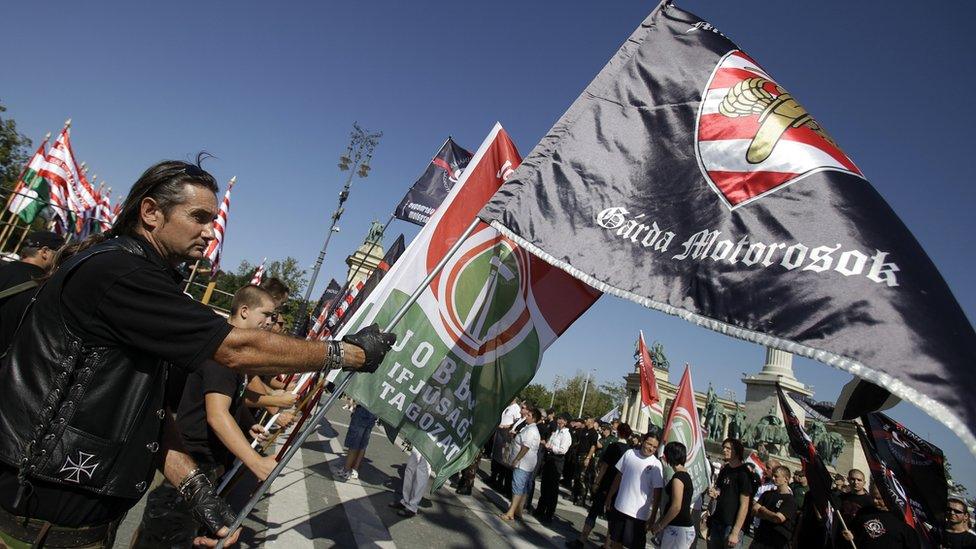Is Hungary's Jobbik leader really ditching far-right past?
- Published

Gabor Vona (C) posted two pictures on Facebook to show that Hungary's Roma had nothing to fear from the Jobbik party
Jobbik is changing fast, its leader Gabor Vona, 38, claims.
From a radical nationalist party which until recently insulted Hungary's Roma (Gypsy) and Jewish communities, to a moderate "conservative people's party", which offers the only realistic chance of ousting Prime Minister Viktor Orban and his Fidesz party.
But is the makeover genuine and could Jobbik really move to the centre?
Gabor Vona's hope is that the tailwind created by the UK's vote to leave the EU and by Donald Trump's presidential success in America could help sweep Jobbik to power in Hungary in 2018.
"What we have in common (with the US) is the demand for change. And there is a majority in Hungary today who want a change of government," he argues.

This protest in Poland a year ago by Jobbik representatives included a neo-Nazi salute
Fidesz, in power since 2010, has lost two battles in the past month and blames Jobbik for both: a 2 October referendum to block EU migrant quotas, and an 8 November vote in parliament to build a migrant quota ban into the constitution.
Mr Orban's push in parliament collapsed because Gabor Vona said he would only back it if Fidesz first abolished a loophole that allows rich foreigners to buy residency. Mr Orban said he would not be blackmailed.
Gabor Vona appears to have the ruling party over a barrel and even aims to bring back the migrant quota ban tied to scrapping the residency loophole.
The fury from the government side is enormous. Jobbik stands accused of treachery, and pro-government media are launching attack after attack.
But Gabor Vona gives as good as he gets. "Viktor Orban is a burnt-out politician, interested only in corruption and football," he said recently.
Mr Orban's greatest failure, he says, was to squander the opportunity to change Hungary for the better when he had a two-thirds majority. "Instead, he created a mafia-type state."
Has the party really ditched its far-right past?
Jobbik was founded in 2003 with a radical nationalist agenda.
It rose to prominence in street protests in 2006 against the Socialist-led government. The same year Gabor Vona set up the Hungarian Guard, a paramilitary organisation that earned the party its extremist credentials.

The intimidating, black-clad Hungarian Guard was established by Gabor Vona but later banned
"There was a huge wave of anger in the country, and as a young man I felt we needed a show of strength against the government." But then, he admits, he lost control of the narrative.
Until it was banned in 2009, the Guard marched through Roma neighbourhoods sowing fear and distrust.
Jobbik also introduced the phrase "Gypsy crime" into public life. The party won 17% in the 2010 elections and 20% in 2014. And yet, Mr Vona insists his party was never racist.
"Because of inexperience and other mistakes the Guard's original purpose was turned into a paramilitary and anti-Gypsy group by the media," he claims.
"We raised the problems of Gypsy-Hungarian co-existence. But I accept in a self-critical way that often out of hot-headedness or inexperience some statements were made that I would not make now."
In a recent post on his Facebook page, Gabor Vona even appears with his arm around a Roma woman in Tiszavasvari, a town with a Jobbik mayor since 2010.
"The message I wanted to send was that Tiszavasvari has changed for the better for the whole community including the Gypsies. By now most Roma know that there's nothing to fear from Jobbik," he asserts.

Journalist Petra Laszlo was sacked by a Jobbik-affiliated TV station when she was filmed tripping up migrants in 2015
Anti-Semitism is another frequent charge made against the party.
In 2012, Jobbik ex-Vice-President Csanad Szegedi resigned when his Jewish origin was made public.
Mr Szegedi accepts that his former party is changing, but insists it still has a very long way to go.
"Gabor Vona's change of heart will only be credible if he is able to face up to the crimes he committed, and asks for forgiveness from all those he has offended in his political career. Even then I think he should leave politics and find a way to atone for all his mistakes," he told the BBC.
Rebranding an anti-migrant party
Nowadays, Gabor Vona prefers to avoid political labels. "If I lived in Greece I would probably vote for Syriza, though they are supposed to be on the left," he suggests.
And unlike other party leaders associated with the far right, he admires the Sufi tradition of Islam: something he has struggled to explain to his vehemently anti-migrant party.
Earlier this year, Gabor Vona removed two party vice-presidents who de-filed the EU flag. Then he laid out a vision for Jobbik as a "modern conservative party" and he now promises to restore the checks and balances lost under Mr Orban.
"I don't calculate how many old supporters we have, and how many new ones. I put a programme on the table. And people can decide whether they believe in it or not."
- Published11 June 2015
- Published26 January 2014
